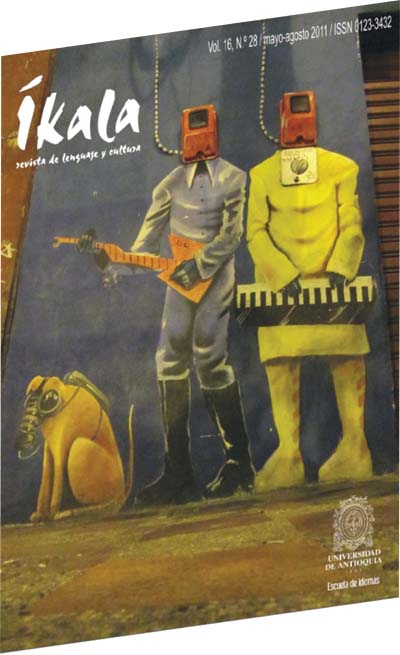Exploring Writer Identity in Mexican EFL Students’ Academic Writing
DOI:
https://doi.org/10.17533/udea.ikala.8002Keywords:
writer identity, text analysis, pronouns, academic writing, EFL writing.Abstract
The objective of this study was to explore writer identity in Mexican undergraduate students of Applied Linguistics writing in English. We focused on the participants' use of first person pronouns and the ways in which they conceptualized their identity as authors of their essays. We employed a combination of text analysis and discourse-based interview methodologies. Findings indicate that participants that made ample use of first person pronouns employed them to present personal experiences rather than to project a strong authorial self. By contrast, those who made little use of first person pronouns seemed to project stronger authorial selves by employing a broader range of stylistic choices. The use of first person pronouns is not essential in the development of strong authorial selves. Higher education should provide better opportunities and resources for students to learn how to project a strong authorial presence in the academic texts they write in English.
Downloads
References
Cadman, K. (1997). Thesis writing for international students: a question of identity? English for Specific Purposes, 16 (1), 3-14.
Cherry, R. (1988). Ethos versus persona: Self-representation in written discourse. Written Communication, 5 (3), 251-276.
Clark, R. & Ivanic, R. (1997). The Politics of Writing. London: Routledge.
Glaser, B. G. & Strauss, A. L. (1967). The Discovery ofGrounded Theory. Hawthorne, NY: Aldine.
Harwood, N. (2005). Nowhere has anyone attempted... In this article I am to do just that' A corpus-based study of self-promotional I and We in academic writing across four disciplines. Journal ofPragmatics, 37, 1.207-1.231. Retrieved on August 10, 2010, from:
http://privatewww.essex.ac.uk/~nharwood/Self-Promotional%20Pronouns%20Final%20Version.pd
Hyland, K. (2000). Authority and invisibility: authorial identity in academic writing. Journal of Pragmatics, 34, 1.091-1.112. Retrieved on
November 3, 2010, from: http://www2.caes.hku.hk/kenhyland/files/2010/12/invisibility.jop_.pdf
Hyland, K. (2001). Humble servants of discipline? Self-mention in research articles. English for Specific Purposes, 20, 207-226.
Hyland, K. (2002a). Options of identity in academic writing. ELT Journal, 56 (4), 351-357. Retrieved on November 12, 2010, from: http://www2.caes.hku.hk/kenhyland/files/2010/12/self.ESP_.pdf
Hyland, K. (2002b). Teaching and researching writing. GB: Pearson Education.
Hyland, K. (2002c). Authority and invisibility: authorial identity in academic writing. Journal of Pragmatics, 34, 1.091-1.112. Retrieved on November 3, 2010, from: http://www2.caes.hku.hk/kenhyland/files/2010/12/invisibility.jop_.pdf
Hyland, K.. (2004a). Disciplinary Discourses: Social Interactions in Academic Writing. Ann Arbor, MI: The University of Michigan Press.
Hyland, K. (2004b). Disciplinary interactions: metadiscourse in L2 postgraduate writing. Journal of Second Language Writing, 13, 133-151. Retrieved on November 5, 2010, from: http://www2.caes.hku.hk/kenhyland/files/2010/12/md-dissertations.pdf
Hyland, K. (2005). Metadiscourse. London: Continuum.
Ivanic, R. (1998). Writing and Identity: The Discoursal Construction ofldentity in Academic Writing. Amsterdam: Benjamins.
Ivanic, R. & Weldon, S. (1999). Researching the writer-reader relationship. In Candlin, C. N. & Hyland, K. (Eds.), Writing: Texts, Processes and Practices (pp. 168-192). London: Longman.
Kuo, C. H. (1999). The use of personal pronouns: Role relationships in scientific journal articles. English for Specific Purposes, 18 (2),
-138.
Lincoln, Y. S. & Guba, E. G. (1985). Naturalistic inquiry. London: Sage.
Martínez, I. A. (2005). Native and non-native writers' use of first person pronouns in the different sections of biology research articles in English. Journal of Second Language Writing, 14, 174-190.
Navarro, M. A., Sánchez, I., Cruz, L. y Lladó, D. (2005). La reforma universitaria en la Universidad Autónoma de Tamaulipas. México: UAT.
Odell, L., Goswami, D. & Herrington, A. (1983). The discourse-based interview: A procedure for exploring the tacit knowledge of writers in nonacademic settings. In Mosenthal, P., Tamor, L. & Walmsley, S. A. (Eds.), Research on Writing: Principles and Methods (pp. 221-236). New York: Longman.
Shen, F. (1989). The classroom and the wider culture: Identity as a key to learning English composition. In Camel, V. & Spack, R. (Eds.), Negotiating Academic Literacies: Teaching and Learning Across Languages and Cultures (pp. 123-133). NJ: Lawrence Erlbaum
Tang, R. & John, S. (1999). The ''I'' in identity: Exploring writer identity in student academic writing through the first person pronoun. English for Specific Purposes, 18, 23-39.
Universidad Autónoma de Tamaulipas (2006). Plan estratégico de desarrollo institucional 20062010. México: UAT.
Vande Kopple, W. J. (1985). Some exploratory discourse on metadiscourse. College Composition and Communication, 36, 82-93.
Vassileva, I. (1998). Who am I/who are we in academic writing? International Journal of Applied Linguistics, 8 (2), 163-185.
Vassileva, I. (2000). Who is the author? A Contrastive Analysis of Authorial Presence in English, German, French, Russian and Bulgarian Academic Discourse. Sankt Augustin: As-gard.












